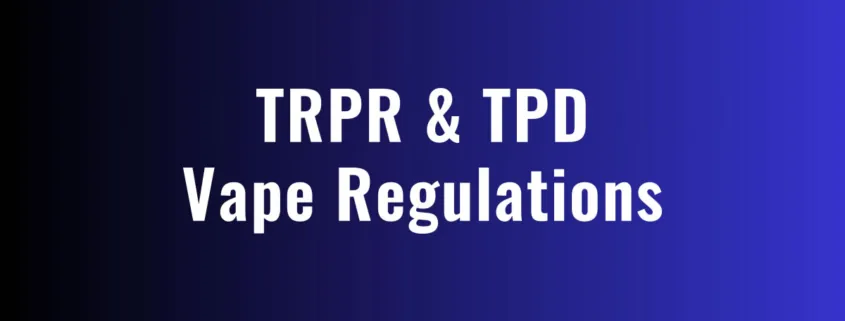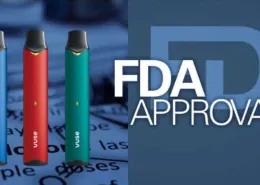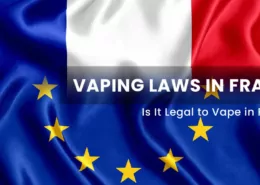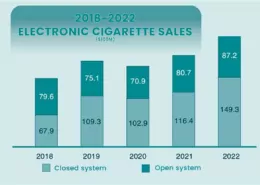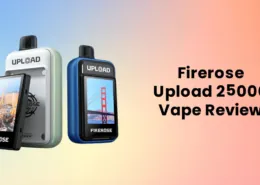TRPR and TPD UK Regulations for Vaping Devices and E-Liquids
In 2014, the European Union introduced the Tobacco Products Directive (TPD), which set new regulations for e-cigarettes and tobacco products. The United Kingdom followed suit in 2016 with the Tobacco and Related Products Regulations (TRPR), implementing and expanding upon the rules set by the TPD. This comprehensive guide will delve into the relevant regulations in the TRPR documents, their implications for British vapers, and provide guidance on staying safe and compliant with your vape devices.
Key TPD UK Regulations for Vapes
The 2016 TRPR documents introduced a range of new guidelines for the buying, selling, and manufacturing of e-cigarettes and e-liquids. The most relevant TPD UK regulations for consumers include:
- Child-resistant and tamper-proof packaging for e-liquid and vape devices
- Leak-resistant and breakage-resistant vape devices
- Clear warning and safety information on all vape products
- A 2ml capacity limit for disposable vapes containing nicotine e-liquid
- Mandatory registration of all e-cigarettes and e-liquids with the MHRA before sale
- Equal nicotine dose delivery across each puff in e-cig devices
- Refillable electronic vape devices without leaking
- Prohibition of caffeine, taurine, and colorings in e-liquids
- A 2ml capacity limit for vape devices with pods, tanks, or cartridges
- A maximum volume of 10ml for e-liquids containing nicotine
- A maximum nicotine strength of 20mg/ml for e-liquids
Differences Between TPD and TRPR
Although TPD and TRPR are similar, there are a few variations to be aware of before submitting your notification:
Different Portals
- TPD notifications must be submitted via the EU-CEG Portal
- TRPR notifications must be submitted via the MHRA Portal
Both portals serve the same purpose but differ in appearance.
Packaging Variations
Packaging requirements vary depending on whether you’re submitting an application under TPD (EU) or TRPR (GB):
Product Conformity Markings
- Under TPD, use the CE mark to state conformity with EU directives
- Under TRPR, use the UKCA mark to state conformity with UK regulations
Products can carry both CE and UKCA markings if they fully comply with both EU and UK directives/regulations.
Information Leaflet
- TPD requires a leaflet with every product, regardless of the information on outer packaging
- TRPR does not require a leaflet if all relevant information is displayed on outer packaging
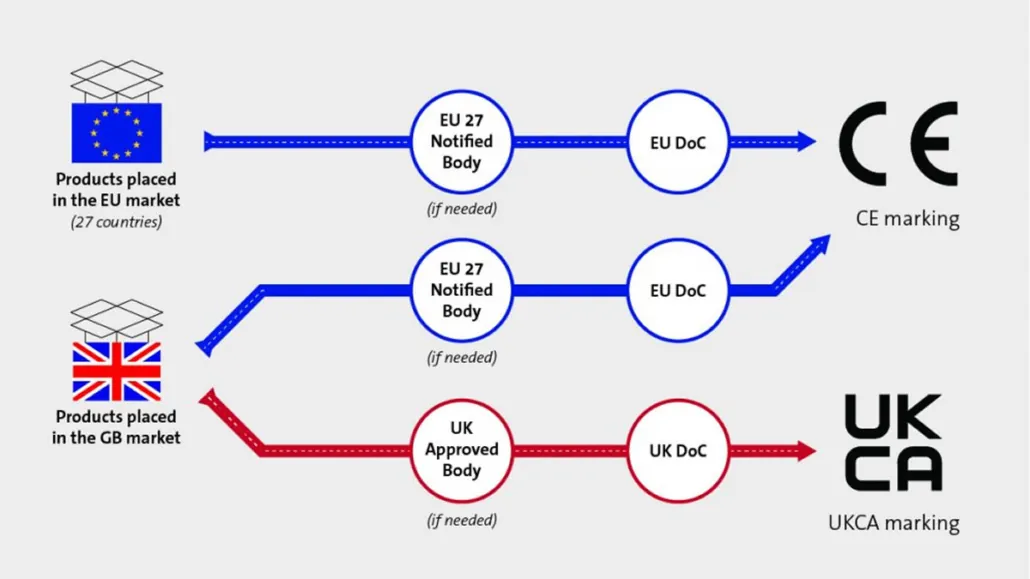
Cost of TPD/TRPR Applications
Application costs vary between TPD and TRPR, as well as specific EU countries:
- TPD submissions: €0-€1000 per notification
- TRPR submissions: £150 per notification with an annual fee of £80
Impact of TRPR Regulations on Vapers
The main regulations that significantly impacted consumers were changes to nicotine strengths and the sale of nicotine-containing e-liquids. The new regulations limited nicotine-containing e-liquids to 10ml bottles, a much smaller size than what many vapers and manufacturers were accustomed to.
Manufacturers introduced shortfill bottles as a solution to these nicotine limitations. These bottles offer nicotine-free e-liquid in volumes of 50-100ml, depending on the desired nicotine strength. Vapers can add their own 10ml nicotine shots to the shortfill bottle to create nicotine strengths of 3mg or 6mg. This regulation inadvertently provided vapers with a more customizable experience, allowing them to choose from freebase nicotine, nicotine salt, and even CBD shots to add to their shortfill bottles.
Another significant regulation affecting vapers is the 20mg/ml (2%) nicotine concentration limit for each vape juice, alongside the reduced 2ml capacity for tanks, pods, cartridges, and disposable vapes. These rules ensure consumer safety and prevent vapers from consuming unhealthy levels of nicotine.
Other TPD UK regulations directly benefit consumers, such as the requirement for consistent nicotine dosages across each puff, ensuring a safe and stable vaping experience. Stricter child-proofing laws for vapes and e-liquids have also helped consumers feel safer when purchasing vaping products, reducing the risk of children ingesting vape juices or swallowing small device parts.
Identifying Legal and Illegal Vapes
Despite the strict guidelines introduced by the TPD UK regulations, many products on the British market still violate these rules. To ensure you’re using a legal and safe product, check the MHRA website to verify if a brand is TPD-regulated and approved.
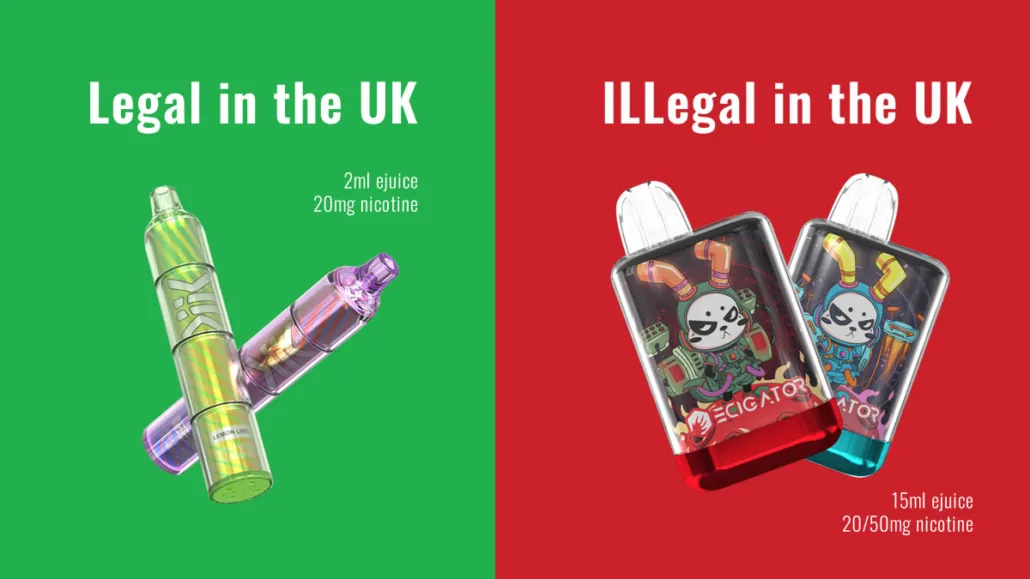
Disposables
- Legal disposables contain no more than 2ml of nicotine e-liquid or advertise a 600-puff equivalent
- Disposables boasting up to 3500 puffs and containing nicotine are likely illegal
- Always buy from reputable retailers to ensure compliance
E-Liquids
- The legal nicotine strength for vape liquids is 20mg/ml
- Nicotine-containing e-liquids can only be sold in 10ml bottles
- Avoid e-liquids advertising strengths higher than 20mg/ml or 2%
- For larger volumes, use shortfill bottles combined with 10ml nic shots
Vape Devices
- Vape devices with pods, tanks, or cartridges must not exceed a 2ml capacity
- Devices that can hold more than 2ml of liquid are unregistered and may pose health risks
Counterfeit Vapes
- Be cautious of counterfeit versions of popular brands like SKE, Lost Mary, and Elf Bar
- Purchase through MHRA-authorized sellers or directly from the brand
- Look for clear nicotine health warnings, ingredient lists, hazard symbols, usage and disposal instructions, expiry dates, and batch numbers on packaging
- If any information is missing, avoid the product
Risks of Using Illegal Vape Products
Using illegal or unregulated vape products can pose serious health risks. These products may contain harmful chemicals and substances, such as diacetyl, which can cause lung damage or “popcorn lung.” Regulated UK vapes do not contain diacetyl or other dangerous chemicals, making them a safer choice for consumers.
Sellers and distributors of illegal vapes face severe consequences, including closure, heavy fines, and even prison time. The TPD regulations were designed to protect the public from harmful products and ensure the availability of safe vapes and e-liquids.
The Future of Vaping in the UK
While vaping remains legal in the UK, there is growing speculation about a potential ban on disposable vapes due to concerns over environmental impact, unlicensed products, and their appeal to children and teenagers. As other countries have already taken steps to ban disposable vapes, it is possible that Britain may follow suit in the near future.
Currently, there are no laws against vaping in public places, although organizations can set their own vaping policies. Public transport providers, large chain restaurants, shops, department stores, and pubs like Wetherspoons have banned the use of vapes inside their premises. When in doubt, always ask a staff member or refrain from vaping until outdoors.
Choosing TPD Compliant Products
As the vaping industry continues to evolve, it is crucial for vapers to stay informed about the latest regulations and guidelines. While a full ban on vaping in Britain is unlikely, given the NHS’s endorsement of vapes as a stop-smoking aid, it is essential to choose TPD compliant products to ensure safety and quality.
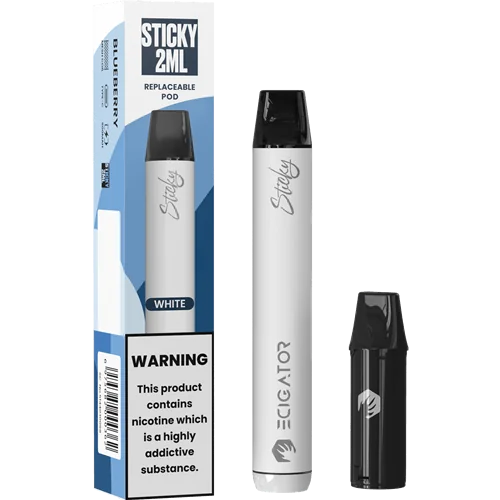
Ecigator Sticky Prefilled Pod Kit
The Ecigator Sticky Prefiiled Replaceable Vape Pod Kit is new kind of vape kit which the prefilled disposable pod can be changed.
That means you don’t need to throw away the whole kit but just change another pod. Also you can change the pods to taste different flavors.
- Is It Illegal to Vape or Smoke While Driving in Minnesota? - August 15, 2025
- American Airlines Vaping Passenger Alleges Assault in Police Report - August 15, 2025
- NEXA PIX 35K Disposable Vape with Crystal Tank Review - August 15, 2025

